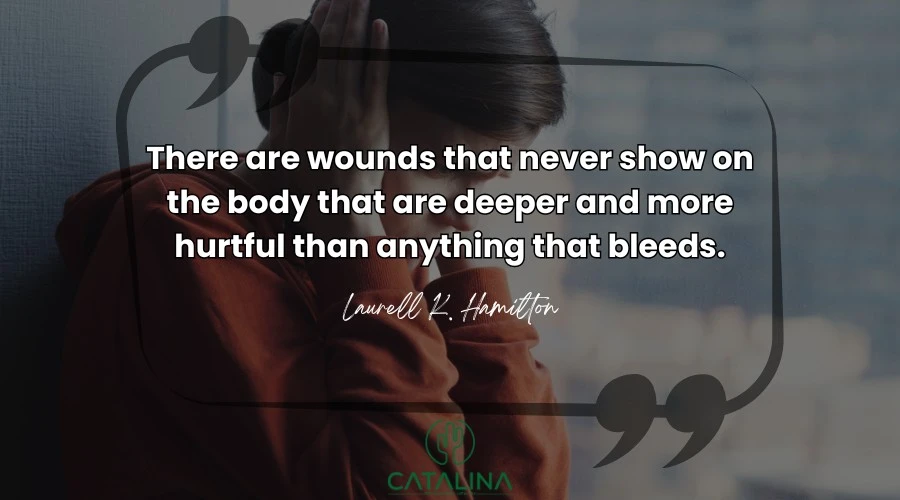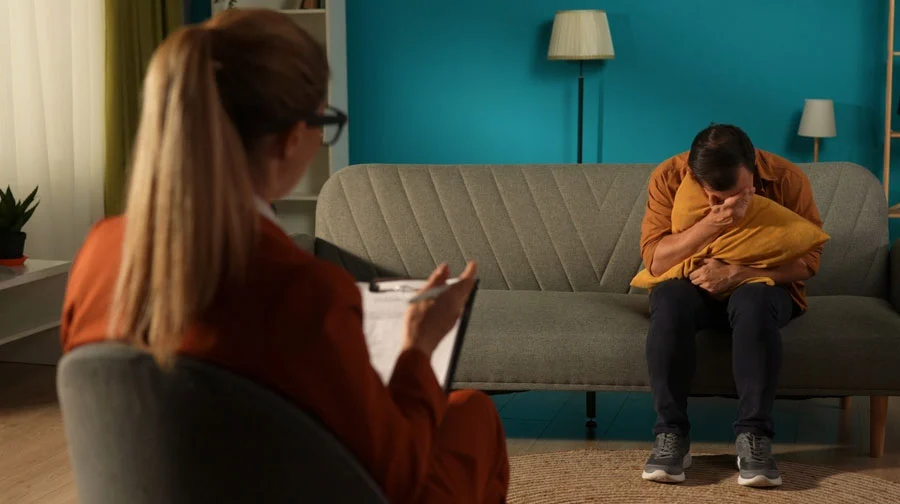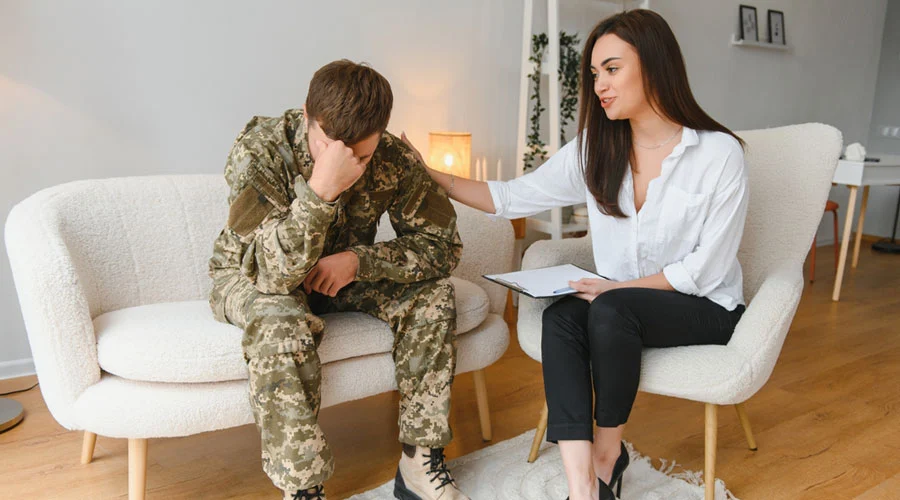A Closer Look at Heightened Awareness of Noises in CPTSD
Explaining the relationship between complex PTSD and noise sensitivity to someone who does not have post-traumatic stress disorder can be extremely challenging. While trauma survivors may easily understand the difficulty tolerating sounds, those without it often dismiss it as a mental illness and cannot fathom how loud sounds can literally pain someone.
This is where our resource can help, both in providing you a better understanding, as well as way for your loved ones and others to comprehend better just how agonizing certain sounds can be.
Catalina Behavioral Health is gaining notice across Arizona for our highly effective drug and alcohol treatment programs. However, we offer much more than that! We are also behavioral health experts with years of experience in helping people heal from post-traumatic stress disorder and other mental health issues.
Please keep reading to gain deep insights about the confirmed link between C-PTSD and avoiding loud noises, and remember we are here to support you with accredited trauma treatment programs!
Confidential Trauma and PTSD Assessment
Post-Traumatic Stress Disorder and Noise Sensitivity
Almost everyone knows the more typical signs of PTSD: nightmares or night terrors, flashbacks, anxiety, hypervigilance, sleep loss, and unexplained fear. However, our brains process trauma in many different ways, and noise or sound sensitivity is one of the lesser-known symptoms of post-traumatic stress disorder.
Noise sensitivity can be extremely challenging because it’s difficult for those who struggle with PTSD and/or CPTSD symptoms to control the noise in their environments. PTSD and CPTSD survivors might walk down the street and suddenly hear overwhelming noise, such as kids bouncing balls at a park. Or they might hear a nearby lawnmower sound that triggers the all-too-familiar PTSD symptoms.
Misophonia and Other C PTSD Symptoms Related to Noise

Misophonia describes a condition in which the PTSD brain responds emotionally to specific sounds. Also called trigger sounds, these noises can cause significant trouble for someone with C PTSD. They can trigger hypervigilance and hyper-awareness of others, which makes it hard for them to be around family or friends, or even a partner who triggers their trauma reactions.
They may literally feel drained by the sound of someone chewing gum or popping bubbles and go to great lengths to avoid these noises even when such triggers are caused by a loved one. Even if most don’t perceive these as loud noises, they may bring overwhelming feelings of anxiety or fear in someone with C PTSD.
Hyperacusis: The Nervous System Connection
Hyperacusis is a hearing disorder related to the nervous system’s auditory pathways. It makes everyday noises seem exceedingly loud or painful. Someone with hyperacusis may withdraw from life for the most part, to protect their ears from the offending noises.
Hyperacusis can come from C PTSD, largely because of the constant fear or perceived threat and state of hypervigilance. However, it can have other causes, such as head injury, Lyme disease, Bell’s palsy, or tinnitus.
Hyperacusis management includes wearing over-the-head earphones, exposure therapy, and medication to treat the cause of the hyperacusis. In terms of C PTSD, it often means working with a licensed therapist to help process the trauma that causes it and move past it.
3 Specific Sounds That Can Trigger PTSD and CPTSD Symptoms

Those who are sensitive to noise due to PTSD may have certain triggers, usually related to hypervigilance. Here are a few noises that can affect their emotional well-being:
1) High Frequency Sounds That Trigger PTSD and CPTSD
The sharp, loud noises that come from high-frequency sounds can cause great pain for someone dealing with trauma:
- Electronic beeps from devices, alarms, or timers
- Whistles from trains, humans whistling to call their dogs home, or even a tea kettle on top of a stove
- Squeaks from doors, chairs, or loose floorboards
- Engine noise from a car, lawn mower, or vacuum cleaner
- Animal noises, like bird calls, dogs whining, or hooves clapping on a roadway
Avoiding these triggers of CPTSD symptoms can cause great disruption in a person’s life. Some may face social isolation if they keep to themselves to avoid loud noise.
2) High-Pitched Sounds That Can Make Someone With PTSD Literally Feel Pain
Here are some high-pitched sounds that can spur someone’s C-PTSD brain into an overly sensitive state:
- Sudden, loud screams or people yelling or even talking in loud voices
- Crying babies
- Emergency vehicle sirens, such as firetrucks or ambulances
- Shattering glass
Different startle reflex types respond to this sound category differently. These loud noises are often sudden, and the person with C PTSD has little control over when or if a sound will happen.
Get Effective Trauma Treatment Options
3) Competing Sounds Can Make Bad Days With C PTSD Feel Even Worse
Competing sounds are a combination of lots of noises that develop and can overload the brains of PTSD and CPTSD survivors. Many of these noises can have roots in childhood memories and trauma.
Here are a few examples:
- Kids bouncing balls in a crowded park while loud noises come from barking dogs nearby
- A crowded store where a shopper speaks loudly on a cell phone while a store maintenance worker runs a vacuum cleaner
- Music plays in a crowded restaurant while people talk and clink glassware and servers slide noisy ceramic dishes onto a table.
These can cause emotions to run high for someone with C PTSD; they may become moody or get anxious in public spaces. It can be even worse if they also have sensitivity to other environmental factors, such as bright lights.
Getting Help for Noise Sensitivity and the Hypervigilance of the Traumatized Brain

Catalina Behavioral Health takes a holistic approach to helping every individual with complex PTSD overcome noise sensitivity. Our evidence-based approach to treatment and deep insight from working with trauma survivors from all walks of life give us the tools to help healing begin.
- CBT: Some clients will attend cognitive-behavioral therapy (CBT), working on changing the negative thoughts associated with PTSD. By learning how to reframe the trauma, each person can learn to manage it. Besides managing the aversion to loud sounds, this treatment also helps heal flashbacks, hypervigilance, and sleep loss that often go along with PTSD.
- Exposure therapy: This method gradually exposes the brain and sensory system to the trigger sound in a controlled setting. Over time, the sensitivity to the noise has less impact on one’s life.
- Mindfulness Techniques: Our therapists help clients learn mindfulness techniques, such as deep breathing exercises, to help reduce the impact of trauma. These techniques are important because they can quickly help restore a sense of inner calm for trauma survivors whenever they are trying to fight through a series of bad days or moments. Learning this ability to calm the brain in just a few minutes allows clients to lead their lives without fear of having a public meltdown from the noise triggers.
- Eye Movement Desensitization and Reprocessing: EDMR helps people who struggle with trauma process those bad memories that affect their well-being. This therapy calms the brain and reduces anxiety and hypervigilance.
- Support Groups for PTSD and Trauma: The U.S. Department of Veterans Affairs has mentioned a confirmed link between group therapy and healing the brain from trauma. They mention how group therapy helps veterans with PTSD by exposing them to points of view about trauma, giving them a space to communicate openly, and reducing isolation.
- Family Therapy: In addition to individual and group therapies, therapists can help restore broken connections within families. This counseling provides a space where clients and their loved ones can communicate about how to move forward. Family members gain more insight into C-PTSD and also learn how to become better teammates to the client.
All who have PTSD have differing startle reflex types. Therefore, we work with each person as an individual to learn the trauma triggers and develop an effective treatment plan for PTSD.
We Serve Military Members From Davis Monthan Air Force Base

We accept most group health insurance plans, including TRICARE and TriWest. That means we can provide comprehensive services to current and past military members and their immediate families. Davis-Monthan AFB, with approximately 11,000 active duty service members, is a short drive from our Tucson behavioral health center.
Catalina Behavioral Health recognizes the need to provide a wide range of mental health services for those who have served, particularly Complex PTSD. You have served us; now we are here to serve you.
Up To 100% of Rehab Costs Covered By Insurance
Connect With Catalina for Healing Sound Sensitivity and Complex PTSD
Catalina Behavioral Health has inpatient and outpatient treatment programs that can help you rewind your brain back to its state before the PTSD. We have helped many clients from a diverse array of backgrounds learn how to cope with C PTSD and end their struggles with anxiety, fear, and noise sensitivity.
If loud sounds seem to literally pain you, it’s time to get the help you deserve. Connect with the admissions team at Catalina Behavioral Health today.




